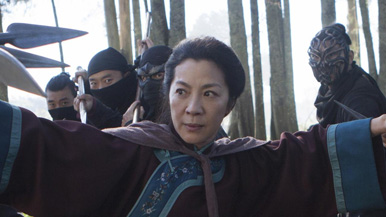|
|
Movie Review:
|

|
Now, this was not entirely fair. A film should be approached with impartiality, and I believe I have been unconsciously sharpening my knives since I saw the first trailer for Netflix's new sequel to Ang Lee's Crouching Tiger, Hidden Dragon. As a favor to yourself before you watch this second film, go back and watch the 2000 original. It is superlative even in a strict technical sense; witness that first chase across the rooftops of Beijing, and the fluid elegance of the martial arts sequence between the two women that follows. Apart from the action scenes, there is the story, which alternates between pulp and mature, even elegiac wistfulness with uncommon grace.New at BOP: Share & Save
![]() Tweet
Tweet
![]() Print this column
Print this column
There are moments where The Sword of Destiny finds that proper balance. Returning from the first film is Yu Shu Lien (Michelle Yeoh, having aged barely at all), ruminating over the intervening years between now and the loss of the first film's swordsman Li Mu Bai. His name is invoked multiple times in the early passages of this film, and the significant thematic point appears to be posterity - how a fabled master's name and reputation can persist long after their death, and manifest in the reputation and standing of their loved ones. There is precious little time given over to this before the movie's main plot kicks into gear: a villainous warrior named Hades Dai (Jason Scott Lee), desiring the mythic Green Destiny sword, employs one of his followers to steal it from its current resting place in Beijing. That follower, Wei-Fang (Harry Shum, Jr.) is interrupted and captured during the theft by young apprentice Snow Vase (Natasha Liu Bordizzo). We are also introduced to Silent Wolf (Donnie Yen), who has arrived seemingly to protect the Green Destiny from Hades Dai and his encroaching army. Wolf commands a force of his own, though, and there is a complicated history between himself and Shu Lien.
|
Advertisement |
The Sword of Destiny is based on the fifth and final book in Wang Du Lu's Crane-Iron series; if you follow along with the beats outlined above, though, it's not hard to figure out that we're dealing with a fairly comprehensive remake of the 2000 film's storyline and themes. I have not read the source novel, so I'm ill-equipped to judge how accurate to it this film is; I would not be at all surprised to discover that the film's procession owes more to a nostalgia-happy culture than literary faithfulness. Were this not a direct sequel affiliated with the property, it would still be easy to watch the proceedings unfold and be regularly reminded of the earlier film - not through the organic growth of plot lines or characters, but through what appear to be deliberate references and call-outs to lines of dialogue and actions from before. The initial theft sequence, for example, seems to take place in roughly the same room and courtyard; much later in the film, Shu Lien echoes a line of dialogue that was originally provided by Mu Bai.
Provided, I must add, with a good deal more gravity and sense of consequence. It will come as little surprise that the references and callbacks here mostly serve to illustrate that The Sword of Destiny is an inferior sequel to the first film, and that what engendered dramatic truth and affection before plays like amateurish imitation now - flattering, but not to the new installment. Both films contrast a relationship between two older, seasoned warriors with two young and more impetuous, hot-headed ones. In the first film, these latter two consisted of Jen Yu and Lo, played by Zhang Ziyi and Chang Chen. Jen, in particular, we found ourselves attached to: faced with the specter of a suffocating life as a royal placeholder, she rebelled in increasingly destructive and tragic ways that still did not ask that we root against her.
Continued:
1
2

|
|
|

|
Friday, November 1, 2024
© 2024 Box Office Prophets, a division of One Of Us, Inc.

